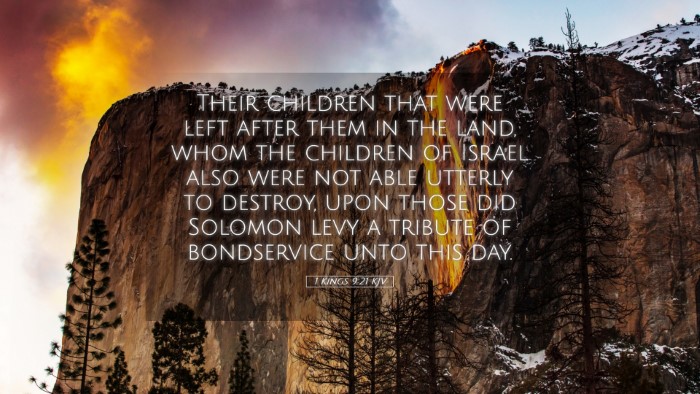Commentary on 1 Kings 9:21
Verse (1 Kings 9:21, KJV): "Their descendants, who were left in the land, whom the children of Israel were not able to destroy, did Solomon make to pay tribute until this day."
Introduction
This verse captures a significant moment in the historical narrative of the Israelites during King Solomon's reign. It sheds light on the outcomes of earlier conquests as well as the socio-political dynamics under Solomon's rule. Public domain commentaries such as those by Matthew Henry, Albert Barnes, and Adam Clarke offer valuable insights into the implications of Solomon's decisions and the broader historical context.
Contextual Analysis
The backdrop of this passage is the Conquest of Canaan, where the Israelites were commanded to annihilate the inhabitants of the land. However, certain groups were left, which ultimately led to their subjugation. This mention not only highlights Solomon's political maneuvers but also serves as a reminder of Israel's incomplete conquest and its consequences.
Historical Background
Matthew Henry notes that the Israelites failed to fully eradicate the Canaanite inhabitants as commanded by God. This disobedience, as reflected in the Book of Joshua, created lasting complications for the Israelites, which resonate in Solomon’s time. Solomon’s tribute system can be seen as a means to integrate these descendants into a broader national economy, yet it also highlights a continued relationship fraught with the tension of past iniquities.
Political Implications
According to Albert Barnes, the tribute signifies submission but also serves a pragmatic purpose; it allowed Solomon to utilize the labor and resources of these peoples for Israel’s benefit. This tribute system was not merely a financial obligation but a symbol of their servitude, sustaining Solomon’s ambitious building projects and military expenditures. Barnes further emphasizes that Solomon’s exploitative practices, while politically astute, had ethical implications regarding justice and equity for the people under tribute.
Theological Reflection
Adam Clarke points out that this verse illustrates the complex interplay between divine mandate and human action. The Israelites were given a divine command to dispossess the inhabitants, yet their failure highlights a theological tension between God’s sovereignty and human agency. Clarke suggests that this ongoing tribute serves as a reminder of God’s providence and the fulfillment of His promises, albeit often through imperfect human means. Christians are invited to reflect on how these lessons apply to contemporary issues of displacement and justice.
Lessons for Pastors and Theologians
- Incomplete Obedience: The consequences of not fully obeying God's commands can resonate through generations. This serves as a warning for leaders today about the importance of faithfulness in their roles.
- Divine Sovereignty and Human Responsibility: This verse reminds pastors and theologians to grapple with the balance between God's sovereignty in history and the responsibilities of humanity to uphold justice.
- Socio-Political Dynamics: Understanding the socio-political context can deepen a pastor’s preaching and apply lessons from Biblical texts to the contemporary Good Shepherd model, emphasizing care and equity.
- Tribute as a Symbol: The tribute mentioned in this verse can also be seen as a metaphor for what we owe to God and to one another—recognizing our responsibilities towards spiritual and communal well-being.
Conclusion
1 Kings 9:21 serves as a profound reminder of the ramifications of Israel's historical decisions during Solomon’s reign. The commentary from public domain sources offers a rich tapestry of insights that speak to not only the historical context but also the moral, ethical, and theological dimensions of leadership and obedience. For pastors, students, theologians, and scholars alike, this verse invites deep reflection on the implications of human actions within the scope of divine providence, encouraging a renewed commitment to faithfulness and justice.


